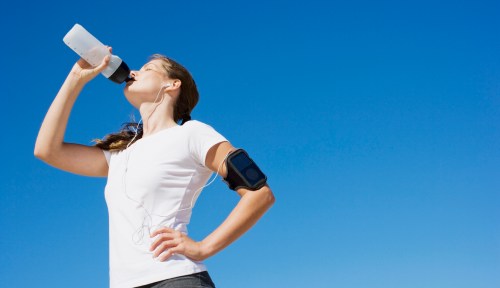Why Does Water Taste Sweet After an Intense Workout? I Asked an RD To Find Out
Are your first gulps after a long run or strenuous ride noticeably delicious? Here's why water tastes sweet after intense exercise.

The first gulps of water I have after a long run are delicious. They’re refreshing and life-giving, yes, but the water also tastes good. It actually tastes sweet, to be more precise.
Experts in This Article
registered dietitian, exercise physiologist, and owner of JM Wellness
Which, when I stopped to think about it mid-gulp one day, I found odd. Isn’t water a famously, um, neutral flavor? And why does it taste different after one of my long runs?
I’m not imagining things: A systematic review of literature on the connection between taste and exercise found that sweet taste intensity and sensitivity increases after acute exercise. However, Jason Machowsky, an exercise physiologist and registered dietitian at the Hospital for Special Surgery in New York City, says why that’s actually happening is not so clear.
“There doesn’t seem to be any well-researched reasons for it,” Machowsky says. “There are, however, a lot of theories.”
The first hypothesis has to do with the idea of “heightened sensitivity.” Machowsky explains that there are minerals in water that do taste sweet to some people, and so after a strenuous workout, those minerals might taste even more noticeably sweeter.
In a related (but semi-gross) explanation, your post-workout water could be dredging up old food particles or residue in your mouth that you’re re-tasting in a more dramatic way, thanks to that sensitivity.
Or something else could be going on entirely. You may have heard of “ketosis,” the metabolic state in which the body burns fat instead of carbohydrates (achieving ketosis is the aim of the keto diet). This state occurs when glycogen stores (which come from carbohydrates) are depleted, so the body turns to fat for energy. What, besides the keto diet, can cause someone to run through their glycogen stores and use fat instead? Intense, prolonged exercise.
Being in ketosis can have some physical manifestations, including—wait for it—sweet breath.
“A ‘sweet’ flavor or aroma to [the] breath is a byproduct of the breakdown of ketones for energy,” says Machowsky. So drinking water and noticing a sweet flavor could come from the interaction of water and your own breath. However, Machowsky notes that this would only come about if someone is adhering to a strict ketogenic diet, or if they have done “sustained activity to significantly deplete your glycogen reserves.” So not just any old workout would cause this—you’d likely need to be doing aerobic exercise for about an hour and 45 minutes before hitting this point.
The ketogenic state resulting in sweet breath is not something you should necessarily aspire to. In particular, for people with diabetes, a sweet taste or sweet breath can be a warning sign that their glycogen stores are low.
“Those who have diabetes who exercise when their blood sugar is not well regulated or too high (>250 mg/dL) may experience ketone production, indicating their body is not properly using the glucose in their body for energy and may be resorting to ketones as energy,” Machowsky says. “Intense exercise can sometimes exacerbate that condition.”
That’s why Machowsky advises that “if you are diabetic and your blood sugar is too high, it may be best to do low intensity activity (like walking) or get your blood sugar back into a safer range before starting high intensity exercise.”
No matter what your post-workout water tastes like, you have to agree that the way our bodies fuel our movement is pretty miraculous. So make sure you’re giving yourself proper nutrition and plenty of rest in between workouts so you can keep living that sweet life.










